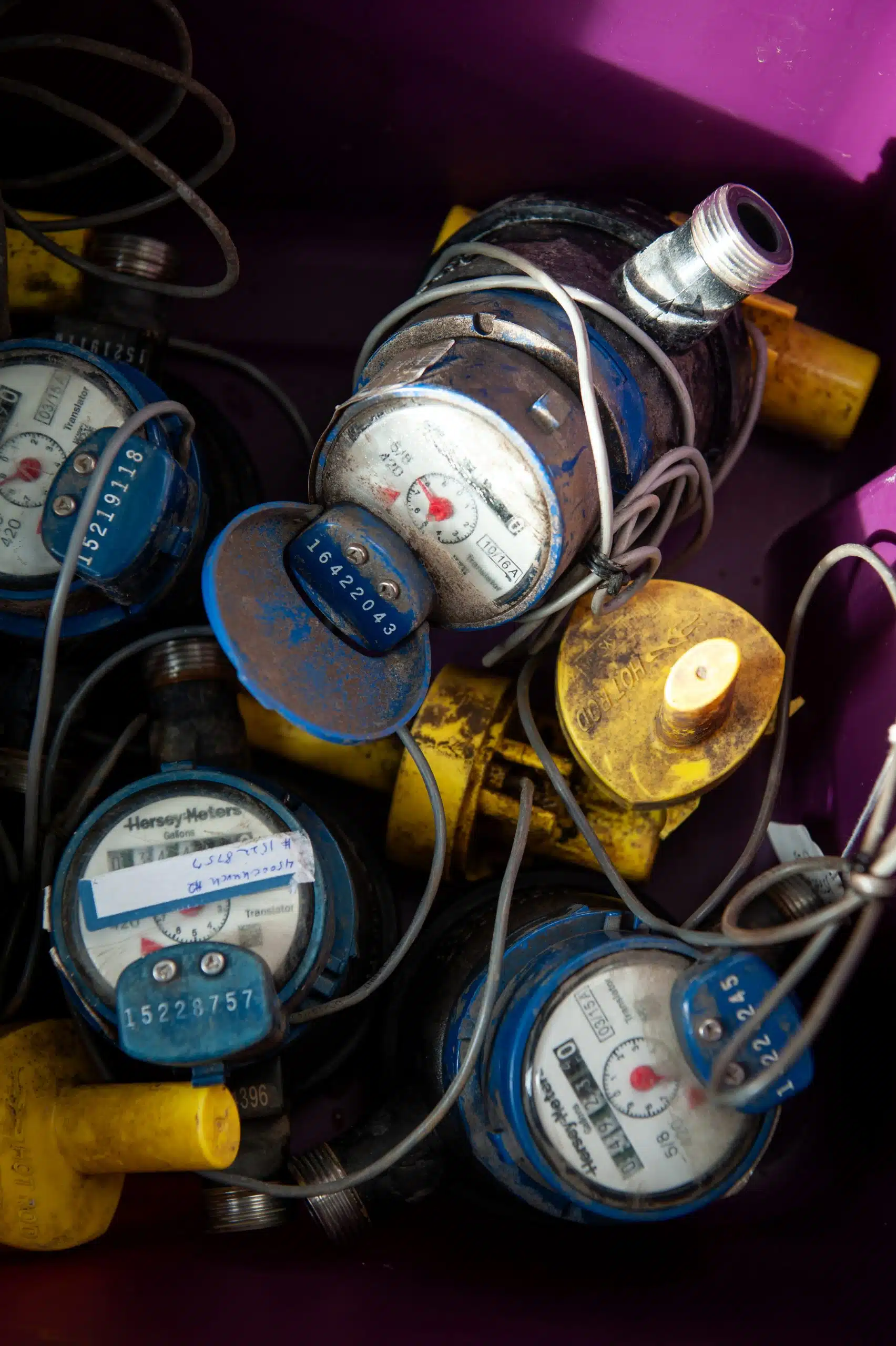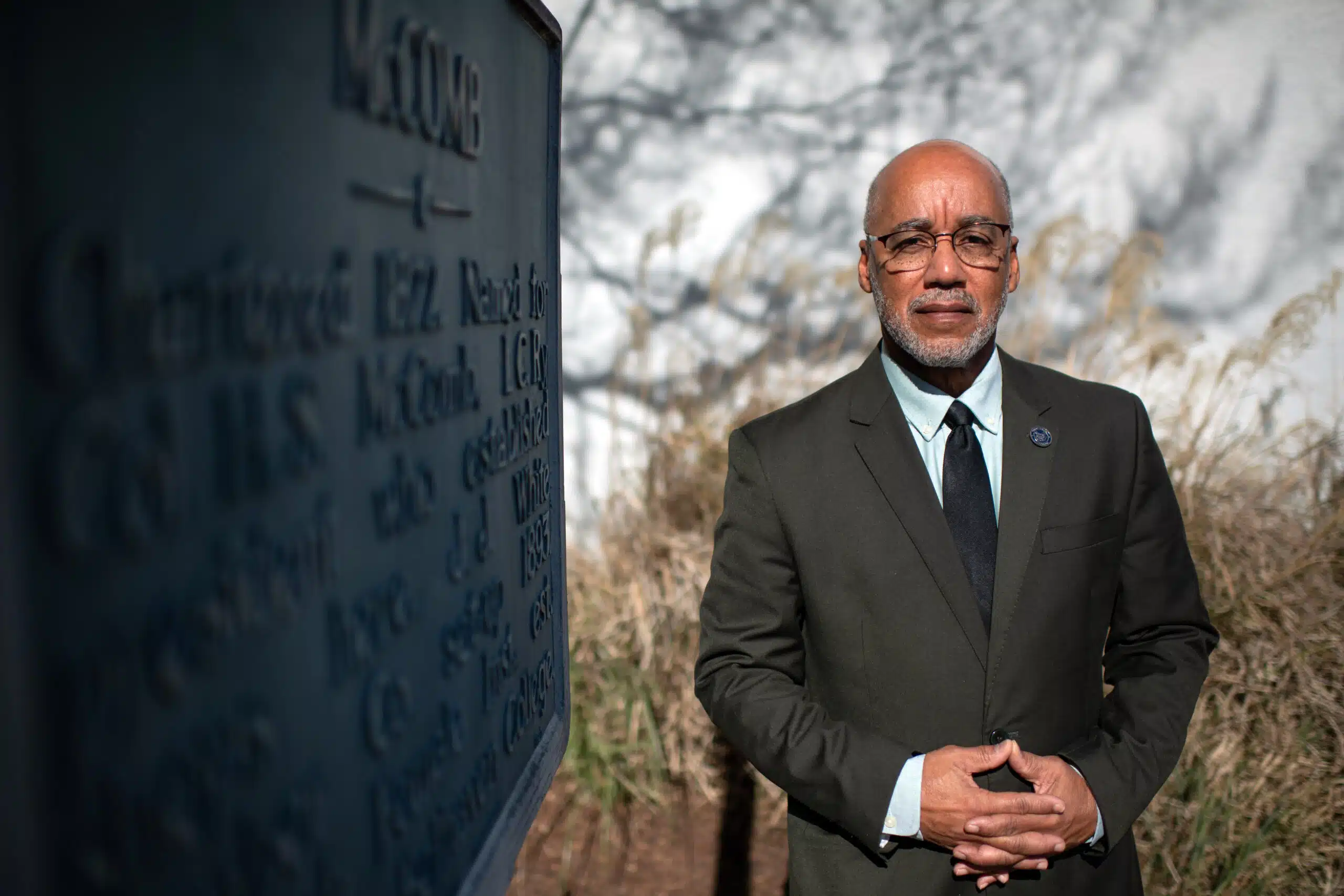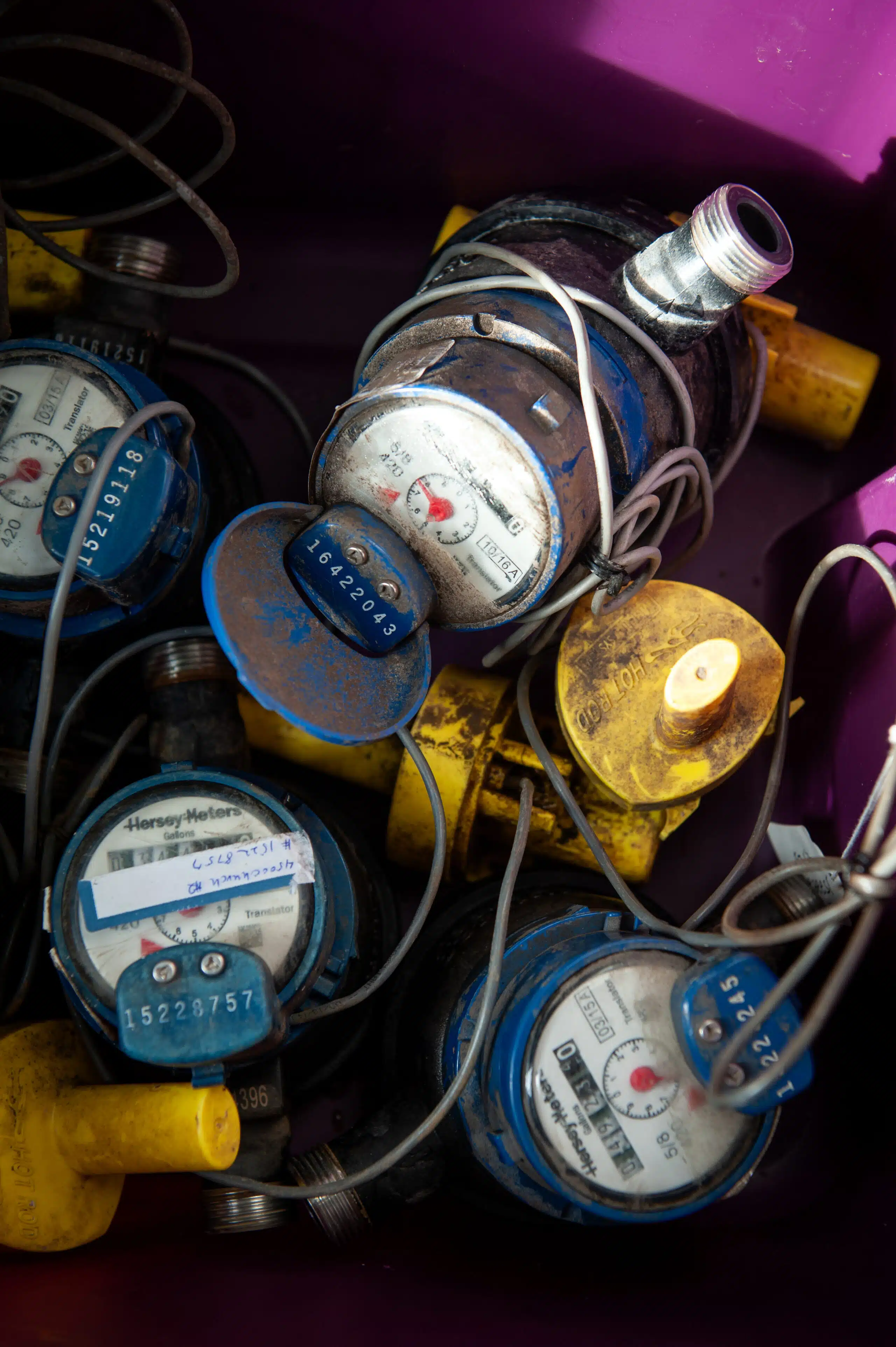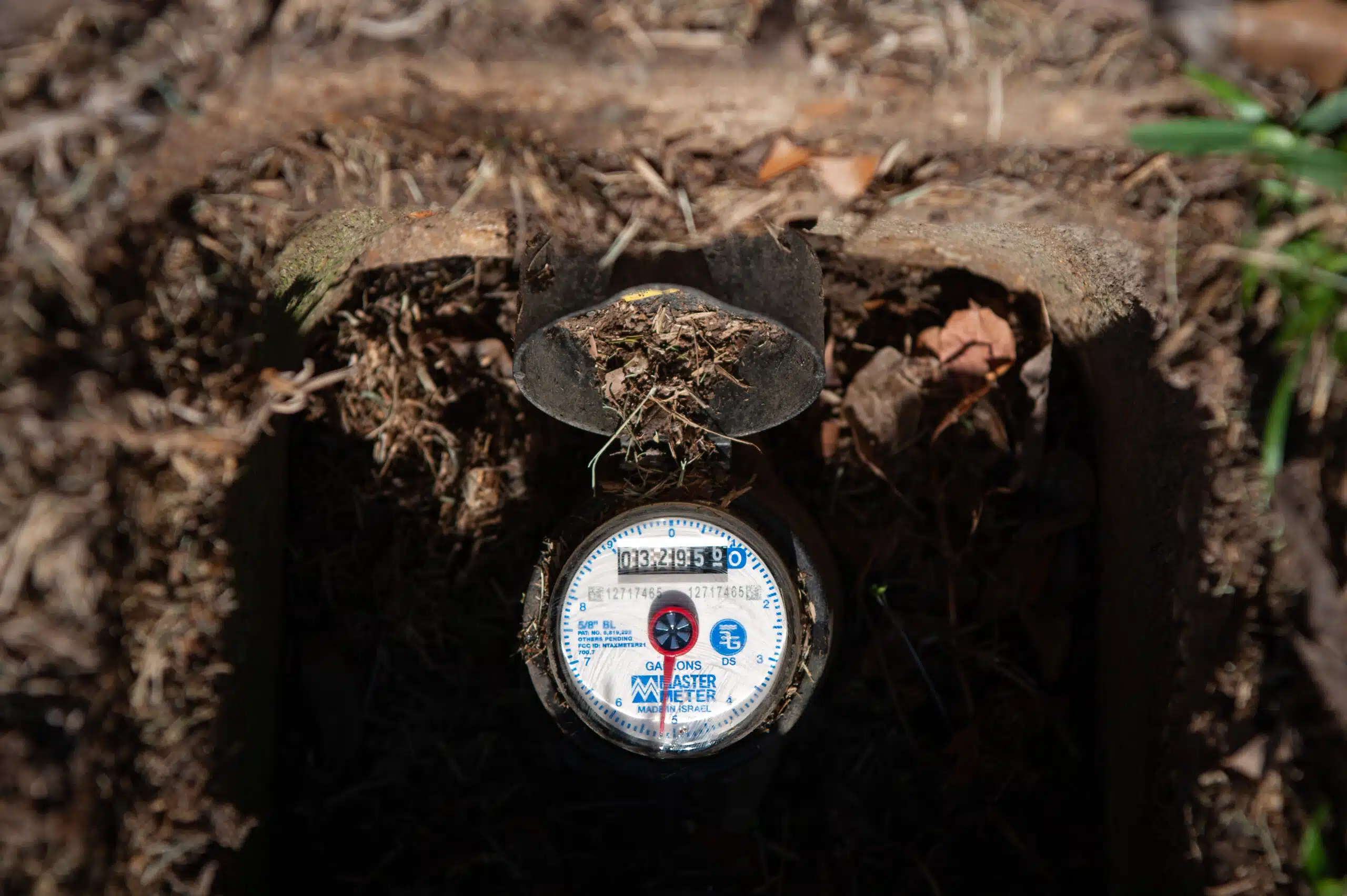Mississippi Today
Big Companies Cashed In on Mississippi’s Water. Small Towns Paid the Price.

Sarah Fowler is reporting on the water crisis in Jackson, Miss., in the state where she was born and raised, as part of The Times’s Local Investigations Fellowship.
In winter 2021, more than 150,000 people living in Jackson, Miss., were left without running water.
Faucets were dry or dribbling a muddy brown. For weeks, people across the city lost the water they normally relied on to drink, cook and bathe. With no way to flush their toilets, some parents sent their children into the woods to relieve themselves. Businesses closed. Mississippi’s capital effectively shut down.
The following year, at the height of Mississippi’s sweltering summer in August 2022, it would all happen again.
Each time Jackson faced a water crisis, local and state leaders cast blame in familiar directions. Lawmakers criticized city officials for ignoring leaky pipes and failing to collect payments from customers. City officials pointed to Jackson’s shrinking population and decades of economic decline. And they said state officials, mostly white and Republican, had starved the mostly Black, Democratic city of resources.
But the final blow was delivered by Siemens, a giant German corporation that had swept into town in 2010, boldly promising to install modern water meters that would boost revenues and return Jackson’s water system to a moneymaking enterprise that could afford to fix its crumbling infrastructure.
Siemens, better known for building power plants and high-speed trains, failed to deliver on its promises. Jackson found itself with many meters that didn’t work and wildly inaccurate water bills it couldn’t collect.
Siemens returned the $90 million it had been paid for the project. But the damage was done. Jackson was out more than $450 million in fees and lost revenue. It had no way to repair failing equipment and aging pipes that left city water unsafe to drink and ultimately led to a federal takeover of the water system in December 2022.
The outlines of Siemens’s role in Jackson’s water issues were laid out publicly in 2019, when the city sued the company. But Jackson was not the only Mississippi city that fell victim to the promise of easy money.

A yearlong New York Times investigation, drawing on thousands of pages of government records and interviews with city officials across the state, reveals how Siemens and other corporations went from one small, cash-strapped town to the next making grand promises to modernize water systems and boost revenues. It also sheds new light on the involvement of a state agency that was supposed to vet the deals.
In town after town, salesmen lured city officials who had little expertise in water meters with gee-whiz technology and complicated cost-saving algorithms. They said the meters could be installed at no cost to taxpayers and offered cash-back guarantees.
Even when meters started failing in large numbers and cities complained they were on the verge of financial disaster, the companies kept selling their services.
For nearly a decade, three companies — Siemens; the Mississippi-based McNeil Rhoads, started by a former Siemens salesman, Chris McNeil; and the North Carolina water meter manufacturer Mueller — crisscrossed the state signing multimillion-dollar deals in cities desperate for money.
Mr. McNeil pitched most of the deals, first for Siemens, then for his own company. He claimed that Mueller’s “smart” meters would be so accurate and efficient they would more than pay for themselves. In accordance with state policy at the time, every project was reviewed by the Mississippi Development Authority, an agency run by executives appointed by the governor.
From 2009 to 2017, at least 10 Mississippi cities signed contracts with the companies to install smart meters or other new technology. All but one have reported problems, and at least four have sued to recoup money they paid to Siemens, McNeil Rhoads or Mueller. Three of those suits are still pending.
Siemens and McNeil Rhoads, competitors that pitched the projects and acted as project managers, hired contractors who installed many meters improperly, according to officials in Jackson, McComb and Moss Point. In some cities, the two companies also struggled to link meters to the home office or to merge a new billing system with an old one.
Officials in at least eight Mississippi cities said they had problems with Mueller’s smart meters, which sometimes didn’t measure accurately because of faulty parts or batteries that died sooner than promised. Water departments in other states, including California and Missouri, have reported similar problems with Mueller meters over the past decade.
McComb, a city of 12,000 people south of Jackson, signed the first Siemens water meter contract in Mississippi. Mayor Quordiniah N. Lockley, city manager at the time, said McComb agreed to pay the company $10 million to install 6,000 smart Master Meters.
But contract workers hired by Siemens put them in backward and missed deadlines to install the antennas that the meters needed to communicate with a central office, Mr. Lockley said. Then some customers saw their water bills hit as much as $1,000 per month, with no obvious explanation.
Mr. Lockley said he called a friend, whom he declined to name, on the Jackson City Council and warned him not to go forward with the developing Siemens deal there.
He said he had one message: “Run.”
“Just because they come in a suit and tie doesn’t mean they’re not selling snake oil,” Mr. Lockley said in an interview.
Even as lawsuits and complaints from customers mounted, the companies continued making the same promises, and state and city officials continued approving contracts.
Jackson ultimately signed a deal with Siemens to install Mueller meters, the largest contract in the city’s history. Officials in Cleveland, a small city in the Mississippi Delta, inked a deal with Siemens for Mueller meters as well. Columbus, Meridian and Moss Point — all largely Black cities of fewer than 35,000 people — hired McNeil Rhoads to install Mueller meters.
Officials in some of the cities say they have been financially crippled.
In a letter to the development authority and the state attorney general, Jamie Lee, the city attorney for Cleveland, wrote that hundreds of meters were malfunctioning and the issue “could lead Cleveland into a major financial deficit if not addressed immediately.” She asked for “the assistance of your two offices in achieving a resolution with Siemens.”
Ms. Lee said she never received a response.
In a statement that did not address complaints by other Mississippi cities, a Siemens spokeswoman, Annie Satow, said the company had invested significant work in Jackson to “help navigate persistent challenges outside the company’s control,” including “substantial assistance beyond contractual requirements” with the billing system.
“Siemens acted in good faith, worked cooperatively with city personnel and was transparent and responsive to oversight by the city’s administration and Department of Public Works,” she wrote.
Mayor Chokwe Antar Lumumba of Jackson said that while he couldn’t discuss the specifics of the deal, Siemens was not entirely to blame. Jackson, he said, willingly entered into a bad agreement. He declined to elaborate, and his office did not respond to repeated requests for an interview. Since the federal takeover, which came with an infusion of $600 million and a third-party manager to run the water system, leaks are being repaired and citywide boil-water notices have drastically diminished.
Mr. McNeil did not return numerous calls seeking comment. A Mueller spokesman and other executives did not respond to repeated calls and emails.
Records show that Siemens and Mueller made attempts to replace or repair some meters in the cities where problems arose, but the cites still lost money and some, including Jackson, McComb and Moss Point, had to pay to replace meters or other technology on their own.
Reached by phone, Glenn McCullough, executive director of the Mississippi Development Authority from 2015 to 2020, said he had not been aware of widespread problems with Siemens, McNeil Rhoads or Mueller. He referred questions to the agency’s spokeswoman, Tammy Craft, who declined to comment.
“We can’t speak on this any further, since no one involved in reviewing these contracts back-when is at M.D.A. anymore,” Ms. Craft wrote.
But she noted that in 2017, state lawmakers passed a bill ending M.D.A.’s oversight of such contracts.

A promising solution for an ailing system
At the time Jackson was considering a deal with Siemens, the water industry was in the midst of a major transition. New technologies had made it possible for sensors to more accurately measure water use. Smart meters could eliminate the need for meter readers to visit homes to calculate people’s water bills, a huge potential savings for utility departments.
Manufacturers, including Mueller, saw the technology as a critical part of their future. But only if they could convince municipal water departments it was worth spending millions of dollars to replace old equipment. In financial statements filed with the Securities and Exchange Commission in 2015, Mueller described water utilities as slow adopters of the technology because of installation costs.
The water industry found a solution in the growing effort to make public agencies and schools more energy-efficient.
As far back as the 1980s, the federal government had been supporting partnerships with private companies to retrofit buildings with more efficient equipment.
Under energy performance contracts, municipalities could borrow money and use it to hire private contractors to replace old light fixtures, air-conditioning units and other appliances. Savings from lower electric bills would then be used to pay off the debt, allowing cities to invest in improvements at no real cost to taxpayers.
The contracts had made Siemens tens of millions of dollars in Mississippi alone and allowed a financially struggling state to afford equipment upgrades that otherwise might have been out of reach.
Then, two years before Siemens pitched a plan to help Jackson fix its ailing water system, the Mississippi attorney general’s office issued an opinion that helped pave the way for even more ambitious projects.
In 2008, the office reviewed the state statute governing energy performance contracts and concluded that cities and school districts could use them to finance projects that conserved water, not just energy.

An opportunity ‘too good to pass up’
In 2009, a decade before Jackson officials sued Siemens over failed meters, the company signed its first water contract in the state in tiny McComb.
McComb had boomed as a railroad city in the 1870s, carved out of a dense pine forest about halfway between Jackson and New Orleans.
Today it resembles a lot of small Mississippi towns: Its shrinking population is almost 75 percent Black. One in three people live under the poverty line. A downtown resurgence has begun, but money for civic improvements is in short supply.
So when Siemens offered a way to fill city coffers through the water department, the opportunity seemed too good to pass up.
According to Mr. Lockley, Siemens told city officials they would be able to disconnect someone’s water with the touch of a button while sitting in their office. New smart meters would measure water use remotely and more accurately.
Siemens said the meters would boost revenues by more than $600,000 a year, sales materials show. And city officials believed McComb would be “one of the top water departments in the state,” Mr. Lockley recalled.
McComb paid Siemens to replace 6,000 water meters, but computer software glitches and delays in installing communication antennae left the city unable to monitor water usage remotely, Mr. Lockley said. Residents also began complaining of erroneous water bills.
When McComb tried to cancel the contract, Siemens sued and the case went to mediation. To get out of the contract, McComb agreed to pay for the meters already in the ground at a cost of $2 million to $3 million, Mr. Lockley said. Then the city hired another company to install software that allowed the meters to function.
Mr. Lockley said he has never spoken publicly about the settlement before because he signed a nondisclosure agreement.
“They tie your hands, say you can’t talk about the situation, and it just keeps happening,” Mr. Lockley said.

Jackson’s crippling ‘sweetheart deal’
Even as problems arose in McComb, Mr. McNeil used the city as a selling point to win new business for Siemens.
Mr. McNeil had been a local football standout in Petal, Miss., before becoming an offensive lineman at Mississippi State University in the early 2000s. He previously had secured a 15-year contract for Siemens to overhaul lighting, air-conditioning and traffic lights throughout Jackson.
He and a fellow salesman, Dusty Rhoads, the son of the mayor of nearby Flowood, traveled the state, pitching similar contracts to financially strapped towns. They eventually left Siemens and started their own company, McNeil Rhoads, signing smart meter contracts with at least six cities.
When pitching to Cleveland, Mr. McNeil, representing Siemens, noted the McComb contract in a sales presentation, city records show. Savings were “guaranteed,” his slide show said. If they fell short, “we will write you a check for the difference.” The statement was followed by eight exclamation points.

In September 2010, Mr. McNeil sent the first in a series of emails to the Public Works Department in Jackson. He had a plan to replace the city’s water meters and make critical repairs to its infrastructure. The project would create jobs, he promised, and the new meters would cover the cost of installation — or else the company would.
Mr. McNeil pursued Jackson officials for two years and backed up his cost-saving claims with a Siemens-funded study of the meters. All of this, he said, had already been done down the road in McComb.
By the end of 2012, Jackson was on the verge of signing a $90 million deal that the city would later estimate cost it $450 million in expenses and lost revenues.
Based on an email Mr. McNeil sent to Jackson’s public works director then, Dan Gaillet, at least one Jackson official was aware of the project in McComb. But Mr. Lockley said no one called him about it and his warning was ignored.
Problems emerged just weeks into the Jackson project. A politically connected subcontractor, hired by Siemens at the recommendation of city officials, had installed some meters improperly, and later, there were communication errors between the meters and receivers. Some meters showed customers not using any water, while others got huge bills that city officials said were implausible.
Unable to calculate realistic bills, Jackson officials stopped collecting from thousands of customers.
The loss of revenue exacerbated years of neglect and poor decision-making and left the water department in dire financial straits and residents facing a near continuous string of boil-water notices. City officials would later accuse subcontractors involved with the project of contributing to the problems, something they deny.
A former Jackson councilman, Melvin Priester, was elected after the city had signed the deal but before groundbreaking had begun. He voiced his objections but was in the minority.
Siemens got a “sweetheart deal,” Mr. Priester told The Times, but “when you are in bad straits like the City of Jackson is now and was in 2013, all of your options are bad deals.”
Calls for help went unanswered
The Mississippi Development Authority, which greenlit the project, was created in 2000 as an economic engine for the state. It directs tax credits to attract companies and gives out millions of dollars in grants to spur revitalization efforts.
As far back as 2010, it also played a role in reducing local energy and water use.
If a city wanted to borrow against future savings for a retrofit project, it had to submit a request to the development authority. State law required the authority to review and approve each contract to “assure that entities can rely upon projected and guaranteed energy savings,” according to policies that were in effect until 2017.
The reviews, conducted by licensed engineers outside the authority, were seen as a critical backstop by city officials, who often lacked the expertise or resources to verify companies’ promises.
“M.D.A. legitimized it,” said Amy St. Pe’, Moss Point’s city attorney, who is suing McNeil Rhoads and Mueller. “Any doubts that we had, when we saw that M.D.A. was backing the program, we felt that it had to be good for the city.”
During a sales pitch, Mr. McNeil cited the agency’s approval process to dispel naysayers in Harrison County, a Gulf Coast community that was considering a project with his company. At a September 2014 meeting, the board of supervisors worried that the county could be left millions in debt if the savings didn’t pan out, according to an article in The Biloxi Sun Herald. Mr. McNeil responded by saying the project was “100 percent regulated by the Mississippi Development Authority,” and the board voted unanimously in favor.

Records show the agency often engaged in back-and-forth with cities seeking approval of the contracts. No application prompted more scrutiny than Jackson’s.
When the development authority reviewed Siemens’s proposal, it raised more than 200 questions, asking how the work being described could possibly save the city money. Mayor Harvey Johnson Jr. sent a 19-page reply that answered and largely dismissed those concerns. One week later, in March 2013, the agency signed off on the contract.
From 2009 to 2017, at least 12 cities pursued energy performance contracts that the agency reviewed, a number of them involving water projects.
Companies pitching the work came up with predicted cost savings using their own methods, records show. Siemens’s estimate, for example, depended largely on how much more accurate new meters would be than old meters. But nowhere in the state’s analysis did engineers ask Siemens or the other companies to prove their calculations.
In a review of hundreds of pages of correspondence between the agency and local officials, The Times did not find a single instance when state officials passed on information about problems cities were experiencing with Siemens, McNeil Rhoads or Mueller.
In fact, when cities directly reported problems and begged the agency for help, they found themselves on their own.
Ms. Lee, the Cleveland city attorney, said she, the mayor and at least two aldermen sought guidance from the agency to no avail.
Ms. Lee wrote her letter in May 2018. A year later, in August 2019, when the city was already embroiled in a lawsuit with Siemens and Mueller, Alderman Gary Gainspoletti sent another letter, pleading with officials as the city was trying to “stop the bleeding.”
An agency official acknowledged receipt, but help never came.
Mr. McCullough, the agency’s executive director at the time, said, “I don’t recall seeing any document regarding defective water meters coming to my desk.”

Warning signs emerge nationwide
For years as companies installed Mueller meters across Mississippi, the meter manufacturer was aware of problems with its products in other states, including California and Missouri.
In 2012, the same year Cleveland was putting faulty water meters in the ground and Jackson was signing its contract, Mueller alerted a water authority in Missouri that some meters had defective magnets that would break, preventing them from recording water consumption, according to a regulatory report. The water authority returned the meters to Mueller for repair.
Years later, a federal class action lawsuit filed in New York by a Mueller shareholder alleged that executives had “misled the investing public” by not being honest about the failure rate of smart meters. The suit was dismissed in 2020, but sworn statements by three confidential informants suggested that Mueller was struggling with high failure rates as early as 2013.
That is when San Diego officials realized that a connection problem was preventing many of the meters from recording data, according to one of the witnesses, described in the suit as a regional manager for Mueller. Residents complained for years of abnormally high bills. The same issues would arise in Jackson and other Mississippi cities.
The suit also pointed out problems that year in Missouri. Mueller replaced nearly 80 percent of water meters in Chillicothe after moisture was found in parts that were supposed to be dry. By 2019, because of battery issues, the replacement meters had a failure rate of 89 percent.
The largest investigation into Mueller by a public utility would unfold in the state. From 2012 to 2015, Missouri American Water installed thousands of Mueller meters. Regulators reported that the meters had “several different kinds of defects,” leading to inaccurate readings or none at all. In August 2015, the utility began a costly campaign to replace 24,000 of the nearly 100,000 that had been installed.
All the while, Mueller was touting its smart meters as a critical driver of growth and telling investors that municipal governments would increasingly seek out the new technology.

‘They preyed on disadvantaged cities’
Mr. McNeil continued to push Mueller meters. After winning Siemens the Jackson contract, he started his own company and used the meters in energy performance contracts he landed across Mississippi — in Columbus, Gautier, Grenada, Meridian, Moss Point and Tupelo.
Seven years after signing in 2014, Columbus Light and Water Department reported excessive failure rates and began pressing Mueller to make good on an extended warranty it had promised. Early on, the company was responsive, answering emails and sending a batch of parts, according to department records. But when complaints continued, Mueller employees stopped answering the department’s questions, said Mike Bernsen, the utility’s interim general manager in 2021.
“We played it through the channels as far as we could.” Mr. Bernsen said.
Frustrations with getting Mueller officials to respond continued into 2022, emails show. In a series of emails early that year, department officials asked Mueller for a meeting to discuss the increasing number of failing meters, but after weeks without an answer, they concluded the company was avoiding them.
Moss Point, signing with McNeil Rhoads in 2017, discovered problems almost immediately, according to Ms. St. Pe’, the city attorney. Residents’ bills were improbably high, and Mueller initially offered batches of replacement devices.
But then, once the city filed suit, the company claimed it was under no obligation to replace the meters because the city had bought them from McNeil Rhoads, not directly from Mueller. Mueller stopped responding and McNeil Rhoads went out of business, leaving Moss Point with little financial recourse, Ms. St. Pe’ said.
“McNeil Rhoades is who convinced us to purchase these water meters,” she said. “I feel like they preyed on disadvantaged cities, predominantly African American cities.”
Out of the six known cities that hired McNeil Rhoads, four are majority Black.
Mueller may have stopped replying to Columbus and Moss Point, but a sales representative, John Flynn, was still pushing updated meters in Tupelo last June.
In an email to Chris Lewis, the local utility’s superintendent, he asked if the city wanted to “try some of our new meters.” Mr. Lewis said he would take five. Mr. Flynn said they come eight to a box.
Mr. Lewis responded: “Perfect!”
Irene Casado Sanchez contributed reporting. This article was reported in partnership with Big Local News at Stanford University.
This article first appeared on Mississippi Today and is republished here under a Creative Commons license.
Did you miss our previous article…
https://www.biloxinewsevents.com/?p=328531
Mississippi Today
Mississippi prepares for another execution
The Mississippi Supreme Court has set the execution of a man who kidnapped and murdered a 20-year-old community college student in north Mississippi 30 years ago.
Charles Ray Crawford, 59, is set to be executed Oct. 15 at the Mississippi State Penitentiary at Parchman, after multiple requests by the attorney general’s office.
Eight justices joined the majority opinion to set the execution, concluding that Crawford has exhausted all state and federal legal remedies. Mississippi Supreme Court Justice T. Kenneth Griffis Jr. wrote the Friday opinion. Justice David Sullivan did not participate.
However, Kristy Noble with the Mississippi Office of Capital Post-Conviction Counsel released a statement saying it will file another appeal with the U.S. Supreme Court.
“”Mr. Crawford’s inexperienced trial counsel conceded his guilt to the jury — against Mr.
Crawford’s timely and repeated objections,” Noble said in the statement. “Mr. Crawford told his counsel to pursue a not guilty verdict. Counsel did just the opposite, which is precisely what the U.S. Supreme Court says counsel cannot do,” Noble said in the statement.
“A trial like Mr. Crawford’s – one where counsel concedes guilt over his client’s express wishes – is essentially no trial at all.”
Last fall, Crawford’s attorneys asked the court not to set an execution date because he hadn’t exhausted appeal efforts in federal court to challenge a rape conviction that is not tied to his death sentence. In June, the U.S. Supreme Court declined to take up Crawford’s case.
A similar delay occurred a decade ago, when the AG’s office asked the court to reset Crawford’s execution date, but that was denied because efforts to appeal his unrelated rape conviction were still pending.
After each unsuccessful filing, the attorney general’s office asked the Mississippi Supreme Court to set Crawford’s execution date.
On Friday, the court also denied Crawford’s third petition for post-conviction relief and a request for oral argument. It accepted the state’s motion to dismiss the petition. Seven justices concurred and Justice Leslie King concurred in result only. Again, Justice Sullivan did not participate.
Crawford was convicted and sentenced to death in Lafayette County for the 1993 rape and murder of North Mississippi Community College student Kristy Ray.
Days before he was set to go to trial on separate aggravated assault and rape charges, he kidnapped Ray from her parents’ Tippah County home, leaving ransom notes. Crawford took Ray to an abandoned barn where he stabbed her, and his DNA was found on her, indicating he sexually assaulted her, according to court records.
Crawford told police he had blackouts and only remembered parts of the crime, but not killing Ray. Later he admitted “he must of killed her” and led police to Ray’s body, according to court records.
At his 1994 trial he presented an insanity defense, including that he suffered from psychogenic amnesia – periods of time lapse without memory. Medical experts who provided rebuttal testimony said Crawford didn’t have psychogenic amnesia and didn’t show evidence of bipolar illness.
The last person executed in Mississippi was Richard Jordan in June, previously the state’s oldest and longest serving person on death row.
There are 36 people on death row, according to records from the Mississippi Department of Corrections.
Update 9/15/25: This story has been updated to include a response from the Mississippi Office of Capital Post-Conviction Counsel
This article first appeared on Mississippi Today and is republished here under a Creative Commons Attribution-NoDerivatives 4.0 International License.
The post Mississippi prepares for another execution appeared first on mississippitoday.org
Note: The following A.I. based commentary is not part of the original article, reproduced above, but is offered in the hopes that it will promote greater media literacy and critical thinking, by making any potential bias more visible to the reader –Staff Editor.
Political Bias Rating: Centrist
The article presents a factual and balanced account of the legal proceedings surrounding a scheduled execution in Mississippi. It includes perspectives from both the state’s attorney general’s office and the defense counsel, without using emotionally charged language or advocating for a particular political stance. The focus on legal details and court decisions reflects a neutral, informative approach typical of centrist reporting.
Mississippi Today
Presidents are taking longer to declare major natural disasters. For some, the wait is agonizing
TYLERTOWN — As an ominous storm approached Buddy Anthony’s one-story brick home, he took shelter in his new Ford F-250 pickup parked under a nearby carport.
Seconds later, a tornado tore apart Anthony’s home and damaged the truck while lifting it partly in the air. Anthony emerged unhurt. But he had to replace his vehicle with a used truck that became his home while waiting for President Donald Trump to issue a major disaster declaration so that federal money would be freed for individuals reeling from loss. That took weeks.
“You wake up in the truck and look out the windshield and see nothing. That’s hard. That’s hard to swallow,” Anthony said.
Disaster survivors are having to wait longer to get aid from the federal government, according to a new Associated Press analysis of decades of data. On average, it took less than two weeks for a governor’s request for a presidential disaster declaration to be granted in the 1990s and early 2000s. That rose to about three weeks during the past decade under presidents from both major parties. It’s taking more than a month, on average, during Trump’s current term, the AP found.
The delays mean individuals must wait to receive federal aid for daily living expenses, temporary lodging and home repairs. Delays in disaster declarations also can hamper recovery efforts by local officials uncertain whether they will receive federal reimbursement for cleaning up debris and rebuilding infrastructure. The AP collaborated with Mississippi Today and Mississippi Free Press on the effects of these delays for this report.
“The message that I get in the delay, particularly for the individual assistance, is that the federal government has turned its back on its own people,” said Bob Griffin, dean of the College of Emergency Preparedness, Homeland Security and Cybersecurity at the University at Albany in New York. “It’s a fundamental shift in the position of this country.”
The wait for disaster aid has grown as Trump remakes government
The Federal Emergency Management Agency often consults immediately with communities to coordinate their initial disaster response. But direct payments to individuals, nonprofits and local governments must wait for a major disaster declaration from the president, who first must receive a request from a state, territory or tribe. Major disaster declarations are intended only for the most damaging events that are beyond the resources of states and local governments.
Trump has approved more than two dozen major disaster declarations since taking office in January, with an average wait of almost 34 days after a request. That ranged from a one-day turnaround after July’s deadly flash flooding in Texas to a 67-day wait after a request for aid because of a Michigan ice storm. The average wait is up from a 24-day delay during his first term and is nearly four times as long as the average for former Republican President George H.W. Bush, whose term from 1989-1993 coincided with the implementation of a new federal law setting parameters for disaster determinations.
The delays have grown over time, regardless of the party in power. Former Democratic President Joe Biden, in his last year in office, averaged 26 days to declare major disasters — longer than any year under former Democratic President Barack Obama.

FEMA did not respond to the AP’s questions about what factors are contributing to the trend.
Others familiar with FEMA noted that its process for assessing and documenting natural disasters has become more complex over time. Disasters have also become more frequent and intense because of climate change, which is mostly caused by the burning of fuels such as gas, coal and oil.
The wait for disaster declarations has spiked as Trump’s administration undertakes an ambitious makeover of the federal government that has shed thousands of workers and reexamined the role of FEMA. A recently published letter from current and former FEMA employees warned the cuts could become debilitating if faced with a large-enough disaster. The letter also lamented that the Trump administration has stopped maintaining or removed long-term planning tools focused on extreme weather and disasters.
Shortly after taking office, Trump floated the idea of “getting rid” of FEMA, asserting: “It’s very bureaucratic, and it’s very slow.”
FEMA’s acting chief suggested more recently that states should shoulder more responsibility for disaster recovery, though FEMA thus far has continued to cover three-fourths of the costs of public assistance to local governments, as required under federal law. FEMA pays the full cost of its individual assistance.
Former FEMA Administrator Pete Gaynor, who served during Trump’s first term, said the delay in issuing major disaster declarations likely is related to a renewed focus on making sure the federal government isn’t paying for things state and local governments could handle.
“I think they’re probably giving those requests more scrutiny,” Gaynor said. “And I think it’s probably the right thing to do, because I think the (disaster) declaration process has become the ‘easy button’ for states.”
The Associated Press on Monday received a statement from White House spokeswoman Abigail Jackson in response to a question about why it is taking longer to issue major natural disaster declarations:
“President Trump provides a more thorough review of disaster declaration requests than any Administration has before him. Gone are the days of rubber stamping FEMA recommendations – that’s not a bug, that’s a feature. Under prior Administrations, FEMA’s outsized role created a bloated bureaucracy that disincentivized state investment in their own resilience. President Trump is committed to right-sizing the Federal government while empowering state and local governments by enabling them to better understand, plan for, and ultimately address the needs of their citizens. The Trump Administration has expeditiously provided assistance to disasters while ensuring taxpayer dollars are spent wisely to supplement state actions, not replace them.”

In Mississippi, frustration festered during wait for aid
The tornado that struck Anthony’s home in rural Tylertown on March 15 packed winds up to 140 mph. It was part of a powerful system that wrecked homes, businesses and lives across multiple states.
Mississippi’s governor requested a federal disaster declaration on April 1. Trump granted that request 50 days later, on May 21, while approving aid for both individuals and public entities.
On that same day, Trump also approved eight other major disaster declarations for storms, floods or fires in seven other states. In most cases, more than a month had passed since the request and about two months since the date of those disasters.
If a presidential declaration and federal money had come sooner, Anthony said he wouldn’t have needed to spend weeks sleeping in a truck before he could afford to rent the trailer where he is now living. His house was uninsured, Anthony said, and FEMA eventually gave him $30,000.
In nearby Jayess in Lawrence County, Dana Grimes had insurance but not enough to cover the full value of her damaged home. After the eventual federal declaration, Grimes said FEMA provided about $750 for emergency expenses, but she is now waiting for the agency to determine whether she can receive more.

“We couldn’t figure out why the president took so long to help people in this country,” Grimes said. “I just want to tie up strings and move on. But FEMA — I’m still fooling with FEMA.”
Jonathan Young said he gave up on applying for FEMA aid after the Tylertown tornado killed his 7-year-old son and destroyed their home. The process seemed too difficult, and federal officials wanted paperwork he didn’t have, Young said. He made ends meet by working for those cleaning up from the storm.
“It’s a therapy for me,” Young said, “to pick up the debris that took my son away from me.”
Historically, presidential disaster declarations containing individual assistance have been approved more quickly than those providing assistance only to public entities, according to the AP’s analysis. That remains the case under Trump, though declarations for both types are taking longer.
About half the major disaster declarations approved by Trump this year have included individual assistance.
Some people whose homes are damaged turn to shelters hosted by churches or local nonprofit organizations in the initial chaotic days after a disaster. Others stay with friends or family or go to a hotel, if they can afford it.
But some insist on staying in damaged homes, even if they are unsafe, said Chris Smith, who administered FEMA’s individual assistance division under three presidents from 2015-2022. If homes aren’t repaired properly, mold can grow, compounding the recovery challenges.

That’s why it’s critical for FEMA’s individual assistance to get approved quickly — ideally, within two weeks of a disaster, said Smith, who’s now a disaster consultant for governments and companies.
“You want to keep the people where they are living. You want to ensure those communities are going to continue to be viable and recover,” Smith said. “And the earlier that individual assistance can be delivered … the earlier recovery can start.”
In the periods waiting for declarations, the pressure falls on local officials and volunteers to care for victims and distribute supplies.
In Walthall County, where Tylertown is, insurance agent Les Lampton remembered watching the weather news as the first tornado missed his house by just an eighth of a mile. Lampton, who moonlights as a volunteer firefighter, navigated the collapsed trees in his yard and jumped into action. About 45 minutes later, the second tornado hit just a mile away.
“It was just chaos from there on out,” Lampton said.
Walthall County, with a population of about 14,000, hasn’t had a working tornado siren in about 30 years, Lampton said. He added there isn’t a public safe room in the area, although a lot of residents have ones in their home.
Rural areas with limited resources are hit hard by delays in receiving funds through FEMA’s public assistance program, which, unlike individual assistance, only reimburses local entities after their bills are paid. Long waits can stoke uncertainty and lead cost-conscious local officials to pause or scale-back their recovery efforts.

In Walthall County, officials initially spent about $700,000 cleaning up debris, then suspended the cleanup for more than a month because they couldn’t afford to spend more without assurance they would receive federal reimbursement, said county emergency manager Royce McKee. Meanwhile, rubble from splintered trees and shattered homes remained piled along the roadside, creating unsafe obstacles for motorists and habitat for snakes and rodents.
When it received the federal declaration, Walthall County took out a multimillion-dollar loan to pay contractors to resume the cleanup.
“We’re going to pay interest and pay that money back until FEMA pays us,” said Byran Martin, an elected county supervisor. “We’re hopeful that we’ll get some money by the first of the year, but people are telling us that it could be [longer].”
Lampton, who took after his father when he joined the volunteer firefighters 40 years ago, lauded the support of outside groups such as Cajun Navy, Eight Days of Hope, Samaritan’s Purse and others. That’s not to mention the neighbors who brought their own skid steers and power saws to help clear trees and other debris, he added.
“That’s the only thing that got us through this storm, neighbors helping neighbors,” Lampton said. “If we waited on the government, we were going to be in bad shape.”
Lieb reported from Jefferson City, Missouri, and Wildeman from Hartford, Connecticut.
Update 98/25: This story has been updated to include a White House statement released after publication.
This article first appeared on Mississippi Today and is republished here under a Creative Commons Attribution-NoDerivatives 4.0 International License.
The post Presidents are taking longer to declare major natural disasters. For some, the wait is agonizing appeared first on mississippitoday.org
Note: The following A.I. based commentary is not part of the original article, reproduced above, but is offered in the hopes that it will promote greater media literacy and critical thinking, by making any potential bias more visible to the reader –Staff Editor.
Political Bias Rating: Center-Left
This article presents a critical view of the Trump administration’s handling of disaster declarations, highlighting delays and their negative impacts on affected individuals and communities. It emphasizes concerns about government downsizing and reduced federal support, themes often associated with center-left perspectives that favor robust government intervention and social safety nets. However, it also includes statements from Trump administration officials defending their approach, providing some balance. Overall, the tone and framing lean slightly left of center without being overtly partisan.
Mississippi Today
Northeast Mississippi speaker and worm farmer played key role in Coast recovery after Hurricane Katrina
The 20th anniversary of Hurricane Katrina slamming the Mississippi Gulf Coast has come and gone, rightfully garnering considerable media attention.
But still undercovered in the 20th anniversary saga of the storm that made landfall on Aug. 29, 2005, and caused unprecedented destruction is the role that a worm farmer from northeast Mississippi played in helping to revitalize the Coast.
House Speaker Billy McCoy, who died in 2019, was a worm farmer from the Prentiss, not Alcorn County, side of Rienzi — about as far away from the Gulf Coast as one could be in Mississippi.
McCoy grew other crops, but a staple of his operations was worm farming.
Early after the storm, the House speaker made a point of touring the Coast and visiting as many of the House members who lived on the Coast as he could to check on them.
But it was his action in the forum he loved the most — the Mississippi House — that is credited with being key to the Coast’s recovery.
Gov. Haley Barbour had called a special session about a month after the storm to take up multiple issues related to Katrina and the Gulf Coast’s survival and revitalization. The issue that received the most attention was Barbour’s proposal to remove the requirement that the casinos on the Coast be floating in the Mississippi Sound.
Katrina wreaked havoc on the floating casinos, and many operators said they would not rebuild if their casinos had to be in the Gulf waters. That was a crucial issue since the casinos were a major economic engine on the Coast, employing an estimated 30,000 in direct and indirect jobs.
It is difficult to fathom now the controversy surrounding Barbour’s proposal to allow the casinos to locate on land next to the water. Mississippi’s casino industry that was birthed with the early 1990s legislation was still new and controversial.
Various religious groups and others had continued to fight and oppose the casino industry and had made opposition to the expansion of gambling a priority.
Opposition to casinos and expansion of casinos was believed to be especially strong in rural areas, like those found in McCoy’s beloved northeast Mississippi. It was many of those rural areas that were the homes to rural white Democrats — now all but extinct in the Legislature but at the time still a force in the House.
So, voting in favor of casino expansion had the potential of being costly for what was McCoy’s base of power: the rural white Democrats.
Couple that with the fact that the Democratic-controlled House had been at odds with the Republican Barbour on multiple issues ranging from education funding to health care since Barbour was inaugurated in January 2004.
Barbour set records for the number of special sessions called by the governor. Those special sessions often were called to try to force the Democratic-controlled House to pass legislation it killed during the regular session.
The September 2005 special session was Barbour’s fifth of the year. For context, current Gov. Tate Reeves has called four in his nearly six years as governor.
There was little reason to expect McCoy to do Barbour’s bidding and lead the effort in the Legislature to pass his most controversial proposal: expanding casino gambling.
But when Barbour ally Lt. Gov. Amy Tuck, who presided over the Senate, refused to take up the controversial bill, Barbour was forced to turn to McCoy.
The former governor wrote about the circumstances in an essay he penned on the 20th anniversary of Hurricane Katrina for Mississippi Today Ideas.
“The Senate leadership, all Republicans, did not want to go first in passing the onshore casino law,” Barbour wrote. “So, I had to ask Speaker McCoy to allow it to come to the House floor and pass. He realized he should put the Coast and the state’s interests first. He did so, and the bill passed 61-53, with McCoy voting no.
“I will always admire Speaker McCoy, often my nemesis, for his integrity in putting the state first.”
Incidentally, former Rep. Bill Miles of Fulton, also in northeast Mississippi, was tasked by McCoy with counting, not whipping votes, to see if there was enough support in the House to pass the proposal. Not soon before the key vote, Miles said years later, he went to McCoy and told him there were more than enough votes to pass the legislation so he was voting no and broached the idea of the speaker also voting no.
It is likely that McCoy would have voted for the bill if his vote was needed.
Despite his no vote, the Biloxi Sun Herald newspaper ran a large photo of McCoy and hailed the Rienzi worm farmer as a hero for the Mississippi Gulf Coast.
This article first appeared on Mississippi Today and is republished here under a Creative Commons Attribution-NoDerivatives 4.0 International License.
The post Northeast Mississippi speaker and worm farmer played key role in Coast recovery after Hurricane Katrina appeared first on mississippitoday.org
Note: The following A.I. based commentary is not part of the original article, reproduced above, but is offered in the hopes that it will promote greater media literacy and critical thinking, by making any potential bias more visible to the reader –Staff Editor.
Political Bias Rating: Centrist
The article presents a factual and balanced account of the political dynamics surrounding Hurricane Katrina recovery efforts in Mississippi, focusing on bipartisan cooperation between Democratic and Republican leaders. It highlights the complexities of legislative decisions without overtly favoring one party or ideology, reflecting a neutral and informative tone typical of centrist reporting.
-
News from the South - Missouri News Feed7 days ago
Pulaski County town faces scrutiny after fatal overdose
-
News from the South - Arkansas News Feed6 days ago
Group in lawsuit say Franklin county prison land was bought before it was inspected
-
News from the South - Kentucky News Feed6 days ago
Lexington man accused of carjacking, firing gun during police chase faces federal firearm charge
-
The Center Square6 days ago
California mother says daughter killed herself after being transitioned by school | California
-
Mississippi News Video7 days ago
Carly Gregg convicted of all charges
-
Mississippi News Video7 days ago
2025 Mississippi Book Festival announces sponsorship
-
News from the South - Arkansas News Feed6 days ago
Arkansas medical marijuana sales on pace for record year
-
The Center Square7 days ago
FEMA employees fired for using government systems to engage in sexually explicit behavior | National












































